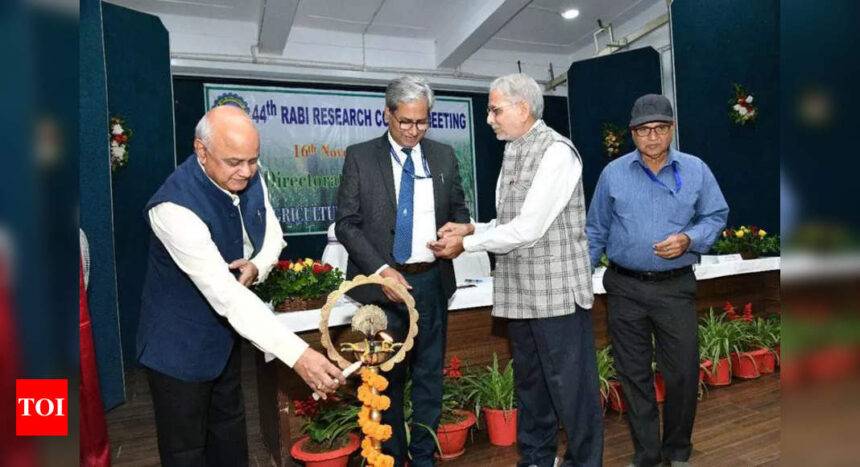Main Points In Hindi (मुख्य बातें – हिंदी में)
-
जलवायु-लचीला कृषि विकास: बिरसा कृषि विश्वविद्यालय (बीएयू) ने रबी फसलों के लिए जलवायु-लचीला और जैव सुदृढ़ीकृत फसल किस्में विकसित करने पर जोर दिया है, जिससे ख़रीफ़ फसलों के दौरान बची नमी का अधिकतम उपयोग हो सके।
-
संरक्षण कृषि पर ध्यान: कुलपति डॉ. एससी दुबे ने सीमित सिंचाई के बावजूद तिलहन, दलहन, और सब्जियों के तहत फसल कवरेज बढ़ाने की बात की, और न्यूनतम पानी के उपयोग के साथ संरक्षण कृषि को प्राथमिकता देने का सुझाव दिया।
-
अनुसंधान और बाहरी वित्तपोषण: डॉ. दुबे ने वैज्ञानिकों से अनुरोध किया कि वे अनुसंधान के लिए बाहरी वित्त पोषित परियोजनाओं को सुरक्षित करने पर ध्यान दें ताकि अनुसंधान जनशक्ति को मजबूत किया जा सके।
-
बिजी की गुणवत्ता: रानी लक्ष्मी बाई केंद्रीय कृषि विश्वविद्यालय के अनुसंधान निदेशक डॉ. चतुर्वेदी ने प्राकृतिक खेती के लिए एकीकृत कृषि मॉडल पर ध्यान केंद्रित करने की सिफारिश की और बीज की गुणवत्ता सुनिश्चित करने की आवश्यकता बताई।
- झारखंड में बागवानी फसल कवरेज: बीएयू के शोध निदेशक डॉ. पीके सिंह ने उल्लेख किया कि झारखंड में बागवानी फसलों का कवरेज राष्ट्रीय औसत से अधिक है, जो क्षेत्रीय संसाधनों के कुशल उपयोग को दर्शाता है।
Main Points In English(मुख्य बातें – अंग्रेज़ी में)
Here are the main points from the article about Birsa Agricultural University (BAU) and its initiatives:
-
Focus on Climate-Resilient Crops: BAU is dedicated to developing climate-resilient and biofortified crop varieties to optimize moisture usage from the Kharif season for Rabi crops.
-
Expansion of Crop Coverage: Chancellor Dr. S.C. Dubey emphasized the need to expand crop coverage, particularly in oilseeds, pulses, and vegetables, despite limited irrigation availability, and prioritized conservation agriculture with minimal water use.
-
Research and Collaboration: Dr. Dubey encouraged the Department of Genetics and Plant Breeding to assess the impact of BAU’s crop varieties on Jharkhand’s agricultural land and to present findings to the state government for better recognition and support.
-
Integrated Agricultural Models: Dr. S.K. Chaturvedi from Rani Lakshmi Bai Central Agricultural University recommended focusing on integrated agricultural models suited to Jharkhand’s socio-economic context, stressing the importance of ensuring seed quality for reliable germination and growth.
- Success in Horticulture: Dr. P.K. Singh, BAU’s research director, reported that Jharkhand’s horticulture crop coverage exceeds the national average, highlighting the state’s effective utilization of regional resources.


Complete News In Hindi(पूरी खबर – हिंदी में)
रांची: बिरसा कृषि विश्वविद्यालय (बीएयू) जलवायु-लचीला और विकसित करने की दिशा में कमर कस रहा है जैव सुदृढ़ीकृत फसल की किस्में रबी फसलों के लिए ख़रीफ़ से बची नमी के उपयोग को अनुकूलित करना। 44वें पर बोल रहे हैं ख़रीफ़ अनुसंधान परिषद शनिवार को बैठक में बीएयू के कुलपति डॉ. एससी दुबे ने कहा, “सीमित सिंचाई के बावजूद, हमें तिलहन, दलहन और सब्जियों के तहत फसल कवरेज का विस्तार करना चाहिए। न्यूनतम पानी के उपयोग के साथ संरक्षण कृषि को भी प्राथमिकता दी जाएगी।”
डॉ. दुबे ने आनुवंशिकी और पादप प्रजनन विभाग से झारखंड की कृषि योग्य भूमि पर बीएयू-नस्ल की फसल की किस्मों के प्रभाव का आकलन करने का आग्रह किया, और बेहतर मान्यता और समर्थन के लिए राज्य सरकार को निष्कर्ष प्रस्तुत करने के महत्व पर जोर दिया।
उन्होंने कहा, “प्रत्येक वैज्ञानिक को अनुसंधान जनशक्ति को मजबूत करने के लिए बाहरी वित्त पोषित परियोजनाओं को सुरक्षित करने का लक्ष्य रखना चाहिए।”
रानी लक्ष्मी बाई केंद्रीय कृषि विश्वविद्यालय, झाँसी के अनुसंधान निदेशक डॉ. एसके चतुर्वेदी ने झारखंड के सामाजिक-आर्थिक संदर्भ के अनुरूप प्राकृतिक खेती के लिए एकीकृत कृषि मॉडल पर ध्यान केंद्रित करने की सिफारिश की।
उन्होंने कहा, “हमें विश्वसनीय अंकुरण और विकास के लिए बीज की गुणवत्ता सुनिश्चित करने की आवश्यकता है।”
बीएयू के शोध निदेशक डॉ. पीके सिंह ने कहा, “झारखंड में बागवानी फसल कवरेज राष्ट्रीय औसत से अधिक है, जो क्षेत्रीय संसाधनों का लाभ उठाने में हमारी सफलता को दर्शाता है।”
Complete News In English(पूरी खबर – अंग्रेज़ी में)
In Ranchi, Birsa Agricultural University (BAU) is gearing up to create climate-resilient and biotic-resistant crop varieties that optimize the use of moisture remaining from the Kharif season for Rabi crops. During a meeting at the 44th Kharif Research Council, BAU’s Vice-Chancellor, Dr. S.C. Dubey, emphasized the need to expand the farming coverage of oilseeds, pulses, and vegetables, despite limited irrigation. He also highlighted the importance of prioritizing conservation agriculture, which requires minimal water usage.
Dr. Dubey urged the Department of Genetics and Plant Breeding to assess the impact of BAU-developed crop varieties on Jharkhand’s agricultural land and stressed the need to present findings to the state government for better recognition and support.
He noted the importance of securing externally funded projects to strengthen research capabilities. Dr. S.K. Chaturvedi, Research Director at Rani Laxmi Bai Central Agricultural University, Jhansi, recommended focusing on integrated agricultural models for natural farming that align with Jharkhand’s socio-economic context. He mentioned that ensuring high seed quality is essential for reliable germination and growth.


Dr. P.K. Singh, Research Director at BAU, added that horticultural crop coverage in Jharkhand exceeds the national average, reflecting the state’s success in utilizing local resources effectively.
Source link








